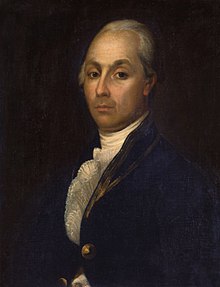Alexander Nikolayevich Radishchev
Alexander Nikolajewitsch Radishchev ( Russian Алекса́ндр Никола́евич Ради́щев , scientific transliteration Aleksandr Nikolaevič Radiščev ; * August 20 July / August 31, 1749 greg. In Moscow ; † September 12 jul. / September 24, 1802 ) was a greg. In Petersburg Russian philosopher and writer. As a supporter of the Enlightenment and opponent of serfdom , he was banned from publication and banned. At the age of 53, he committed suicide .
Life
The son of a Moscow landowner studied law as a member of the Russian page corps and at the request of Catherine II in Leipzig - as a fellow student of Goethe - and joined the French enlighteners Mably (brother of Étienne Bonnot de Condillac ), Rousseau and Helvétius . In philosophy he contributed new ideas for the logical analysis of relations.
Later, in 1790, as Petersburg customs director, he tried to spread the ideas of the Enlightenment ( natural law ) in his novel Journey from Petersburg to Moscow . In this "novel" - in reality a radically enlightening criticism of the, in his opinion, unbearable conditions in Russia under Catherine II - he especially castigated the serfdom and the inhumanity of the ruling and largely depraved aristocratic class. His novel also blames the nobility for the rural Pugachev uprising . Catherine II had him persecuted for this book by Privy Councilor Scheschkowski , who was in charge of the secret police , and sentenced Radishchev to death , later the sentence was commuted to ten years' exile. The ban on traveling from Saint Petersburg to Moscow is considered to be a turning point in Katharina's previously mild censorship practice , which has been significantly tightened in the last few years of her rule.
Ode to freedom
- 1st stanza (of 50)
Source of all great deeds,
Heaven's most precious gift,
Allow, O freedom, that a slave
may remember you in an ode.
O let my heart glow from you
and let it bloom through your strength,
break off the night of slavery,
let Tell and Brutus wake up again.
Seize power and be frightened by
your word of tsarist power.
- 13th verse
An army of avengers will
arise, who
,
suddenly kindled by hope, will one day wipe out the shame
In the blood of the tormentor all together.
I see sharp swords shining
And wreaths of death of all kinds
The proud head, half god.
Rejoice, bound and servants:
By
virtue of innate rights,
the Tsar himself is led to the scaffold.
(From: Journey from Petersburg to Moscow , Leipzig edition 1982, verse transfer by Bruno Tutenberg, page 163 ff)
After Katharina's death, Paul I allowed Radishchev to return to his property. Despite - or because of - his appointment to the legislative commission in 1801, the latter despaired of the hopelessness of the reform efforts and, again under suspicion and in fear of renewed exile, took his own life. However, he also wanted to set a beacon with it.
Radishchev's work, although only circulated orally or in clandestine copies, is said to have had a great influence. It is said that sometimes large sums of money were paid for reading transcripts. It could only appear in Russia after the 1905 revolution .
In 1878 Radishchev's grandson, the painter Alexei Petrovich Bogolyubov , founded the Radishchev Art Museum in Saratov in honor of his grandfather . The main outer belt asteroid (2833) Radishchev is named after him.
Works
- Journey from Petersburg to Moscow , 1790, German a. a. Rütten & Loening Berlin 1952, Reclam Leipzig 1982
- Ode Wolnost (Freedom), 1782 (published 1790)
- Letter to a friend , 1773 (One week diary of 1772, published 1809)
- About man, about his mortality and immortality ,?
literature
- History in Gestalten , Vol. 4, Das Fischer Lexikon, 1963
- Meyer's pocket dictionary , 1967
- Harri Jünger (Ed.): Literatures of the Peoples of the Soviet Union , Leipzig 1967
- Annelies Grasshoff: Radischtschew , in: Helmut Grasshoff (ed.): History of Russian Literature from the Beginnings to 1917 , Vol. 1 From the Beginnings to the Middle of the 19th Century, Pages 217–231, Aufbau-Verlag Berlin 1986 (with further references)
- David Marshall Lang First Russian Radical, Alexander Radischev, 1749-1802 , London: George Allen & Unwin, 1959
- Peter Hoffmann: Aleksandr Nikolaevič Radiščev (1749-1802). Life and work . Peter Lang Edition, Frankfurt am Main 2015, ISBN 978-3-631-65896-3 .
See also
- Radishchev is the focus of a trilogy of novels (1934–39) by the Soviet writer Olga Forsch
Individual evidence
- ↑ whose intention is "to be recognized on every page": ... "the author is filled and poisoned by the French delusion .. (..) .. a rebel, worse than Pugachev ..."
- ↑ zvab , accessed on July 26, 2011
- ↑ For example by Pushkin , as Annelies Grasshoff reports in the afterword of the 1982 Reclam edition (page 212)
- ^ Lutz D. Schmadel : Dictionary of Minor Planet Names . Fifth Revised and Enlarged Edition. Ed .: Lutz D. Schmadel. 5th edition. Springer Verlag , Berlin , Heidelberg 2003, ISBN 978-3-540-29925-7 , pp. 186 (English, 992 pp., Link.springer.com [ONLINE; accessed on September 18, 2019] Original title: Dictionary of Minor Planet Names . First edition: Springer Verlag, Berlin, Heidelberg 1992): “1978 PC 4 . Discovered 1978 Aug. 9 by LI Chernykh and NS Chernykh at Nauchnyj. "
Web links
- Literature by and about Alexander Nikolajewitsch Radishchev in the catalog of the German National Library
- Article Alexander Nikolajewitsch Radishchev in the Great Soviet Encyclopedia (BSE) , 3rd edition 1969–1978 (Russian)
| personal data | |
|---|---|
| SURNAME | Radishchev, Alexander Nikolajewitsch |
| ALTERNATIVE NAMES | Radiščev, Aleksandr Nikolaevič; Ради́щев, Алекса́ндр Никола́евич (Russian) |
| BRIEF DESCRIPTION | Russian philosopher and revolutionary |
| DATE OF BIRTH | August 31, 1749 |
| PLACE OF BIRTH | Moscow |
| DATE OF DEATH | September 24, 1802 |
| Place of death | St. Petersburg |
